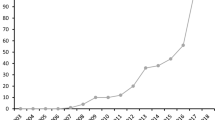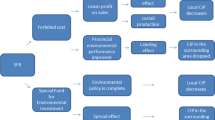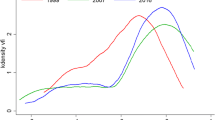Abstract
At present, China’s economy is transforming from rapid development to high-quality development, and environmental pollution stands out as an urgent need to be addressed. Fiscal decentralization is considered to confer economic incentives on local governments to obtain the right to gain and spend in economic growth. However, at the same time, political incentives are given to local officials under the promotion mechanism based on gross domestic product (GDP) assessment, and these two incentives become key to the environmental performance of the jurisdictions. Therefore, this paper incorporates fiscal decentralization, promotion incentives, and environmental pollution into a unified framework and theoretically analyzes the effects of fiscal decentralization, promotion incentives on environmental pollution, and the intrinsic mechanism of action. Using panel data of 30 Chinese provinces from 2002 to 2018, we examine that fiscal decentralization significantly promotes environmental pollution, and this performance is more obvious in economically underdeveloped regions. In terms of its mechanism of action, fiscal decentralization affects environmental pollution by increasing the demand for foreign direct investment, inhibiting technological progress, and enhancing environmental regulation, while foreign direct investment and technological progress significantly inhibit environmental pollution, but environmental regulation does not present a role of pollution control. Further study finds that under the consideration of “GDP-based promotion incentives,” local officials will generate “competition for investment,” relax environmental standards for FDI, and generate “competition for growth”, which will inhibit technological progress and incomplete enforcement of environmental regulations, thus exacerbating local environmental pollution. On this basis, this paper proposes to further deepen the fiscal system reform, promote the optimization of local government competition system, and effectively restrain the vicious competition behavior of local officials under the fiscal decentralization system, so as to provide relevant insights for realizing China’s economic transformation as well as high-quality economic development.
Similar content being viewed by others
Data availability
The datasets used and/or analyzed during the current study are available from the corresponding author on reasonable request.
References
Bian YC, Bai JH (2017) “Competition for growth” versus “competition for innovation”—a new explanation of the impact of fiscal decentralization on technological innovation. Fiscal Research 10:43–53 (In Chinese, CSSCI)
Chen X, Liu J (2020) Fiscal decentralization and environmental pollution: a spatial analysis. Discret Dyn Nat Soc 2020:1–10. https://doi.org/10.1155/2020/9254150
Cheng Z, Zhu Y (2021) The spatial effect of fiscal decentralization on haze pollution in China[J]. Environ Sci and Pollut Res 28(36):49774–49787
Cheng S, Fan W, Chen J et al (2020a) The impact of fiscal decentralization on CO2 emissions in China. Energy 192:116685
Cheng Z, Li L, Liu J (2020b) The impact of foreign direct investment on urban PM2.5 pollution in China. J Environ Manag 265:110532
Colombo D G, Martinez-Vazquez J (2020) Fiscal decentralization and public investment in innovation: a country panel analysis. Publius: The Journal of Federalism 50(4): 672–697.
Cui GH, Jiang YB (2019) The impact of environmental regulation on firms’ environmental governance behavior—a quasi-natural experiment based on the new Environmental Protection Law. Econ Manag 41(10):54–72 (In Chinese, CSSCI)
Cui Y, Zhang W, Bao H et al (2019) Spatiotemporal dynamics of nitrogen dioxide pollution and urban development: satellite observations over China, 2005–2016. Resour Conserv Recycl 142:59–68
Ehrhardt MK, Crenshaw EM, Jenkins JC (2002) Deforestation and the environmental Kuznets curve: a cross-national investigation of intervening mechanisms. Soc Sci Q 83(1):226–243
Gu YY, Shen KR (2012) Local government behavior and corporate R&D investment—an empirical analysis based on inter-provincial panel data in China. China Ind Econ 10:77–88
Guan J, Chen K (2012) Modeling the relative efficiency of national innovation systems. Res Policy 41(1):102–115 (In Chinese, CSSCI)
He Q, Sun M (2014) Does fiscal decentralization promote the inflow of FDI in China? Econ Model 43:361–371
Hao Y, Deng Y, Lu ZN et al (2018) Is environmental regulation effective in China? Evidence from city-level panel data. J Clean Prod 188:966–976
Hao Y, Chen YF, Liao H et al (2020) China’s fiscal decentralization and environmental quality: theory and an empirical study. Environ Dev Econ 25(2):159–181
Hall B, Van Reenen J (2000) How effective are fiscal incentives for R&D? A review of the evidence. Res Policy 29(4–5):449–469
He LY, Ma QS (2020) The impact of fiscal decentralization on urban innovation—based on a local government competition perspective. Econ Manag Stud 41(10):132–144 (In Chinese, CSSCI)
Jiang SS, Li JM (2021) Do political promotion incentive and fiscal incentive of local governments matter for the marine environmental pollution? Evidence from China’s coastal areas[J]. Mar Policy 128:104505
Li Z, Yang SY (2018) The improvement of urban innovation level under the fiscal decentralization system—an analysis based on spatio-temporal heterogeneity. Ind Econ Res 06:50–61 (In Chinese, CSSCI)
Lin C, Sun YJ (2019) The relationship between fiscal decentralization and environmental governance performance in China—an empirical test based on provincial panel data. Econ Syst Reform 02:150–155 (In Chinese, CSSCI)
Liu S, Gu NH (2017) Official governance, foreign direct investment and regional environmental pollution—based on the perspective of officials’ incentives and their heterogeneity. Econ Syst Reform 02:24–30 (In Chinese, CSSCI)
Markusen JR, Venables AJ (1999) Foreign direct investment as a catalyst for industrial development. Eur Econ Rev 43(2):335–356
Oates W (1972) E, Fiscal federalism. Harcourt Brace Jovanovic, New York
Oates WE, Portney PR (2003) The political economy of environmental policy[M]//Handbook of environmental economics. Elsevier 1:325–354
PorterM E, Van der Linde C (1995) Toward a new conception of the environment-competitiveness relationship[J]. J Econ Perspect 9(4):97–118
Pu Z, Fu J (2018) Economic growth, environmental sustainability and China mayors’ promotion. J Clean Prod 172:454–465
Qi Y, Lu HY, Xu YK (2014) A study on the institutional reform of environmental decentralization in China: institutional change, quantitative measurement and effect assessment. China Ind Econ 1:31–43 (In Chinese, CSSCI)
Qian Y, Roland G (1998) Federalism and the soft budget constraint[J]. Am Econ Rev 88(05):1143–1162
Qian XH, Cao TQ, Li WA (2011) Promotion pressure, official tenure and lending behavior of urban commercial banks. Econ Res 46(12):72–85 (In Chinese, CSSCI)
Qiao B, Martinez-Vazquez J, Xu Y (2008) The tradeoff between growth and equity in decentralization policy: China’s experience. J Dev Econ 1:112–128
Shen N, Liu FZ (2012) Does high intensity environmental regulation really promote technological innovation?—a re-test of the Porter hypothesis. China Soft Sci 04:49–59 (In Chinese, CSSCI)
Stewart RB (1977) Pyramids of sacrifice? Problems of federalism in mandating state implementation of national environmental policy. Yale Law Journal 86:1196–1272
Tiebout CM (1956) A pure theory of local expenditures. J Polit Econ 64(5):416–424
Wang YW, Wang JH (2009) Theoretical and empirical analysis of local government behavior and regional industrial structure convergence. Nankai Econ Res 04:33–49 (In Chinese, CSSCI)
Wang L, Lei P (2016) Fiscal decentralization and high-polluting industry development: city-level evidence from Chinese panel data[J]. Int J Smart Home 10(9):297–308
Wang YB, Lu Y (2021) Fiscal decentralization, environmental regulation and regional environmental quality—an empirical analysis based on dynamic panel model. Explor Econ Issues 03:120–137 (In Chinese, CSSCI)
Wang WJ, Zhang JT, Qin CL (2007) Fiscal decentralization, local government competition and the growth effect of FDI. Manag World 03:13-22+171 (In Chinese, CSSCI)
Wang W, Liu YF, Peng DD (2015) Research on the industrial structure upgrading effect of population aging. China Ind Econ 11:47–61 (In Chinese, CSSCI)
Wang J, Wei W, Deng HH et al (2017) Will fiscal decentralization influence FDI inflows? A spatial study of Chinese cities. Emerg Mark Financ Trade 53(9):1988–2000
Wang A, Hu S, Lin B (2021) Can environmental regulation solve pollution problems? Theoretical model and empirical research based on the skill premium[J]. Energy Econ 94:105068
Wu YB (2019) Does financial decentralization promote technological innovation?[J]. Contemp Econ Sci 41(03):13–25 (In Chinese, China)
Wu J, Deng J, Huang J et al (2013) Incentives and outcomes: China’s Environmental Policy. Natl Bureau Econ Res 18754. https://doi.org/10.2139/ssrn.2206043
Yang X, Lin S, Li Y et al (2019) Can high-speed rail reduce environmental pollution? Evidence from China. J Clean Prod 239:118135
Yi M, Wang Y, Sheng M et al (2020) Effects of heterogeneous technological progress on haze pollution: evidence from China. Ecol Econ 169:106533
You D, Zhang Y, Yuan B (2019) Environmental regulation and firm eco-innovation: evidence of moderating effects of fiscal decentralization and political competition from listed Chinese industrial companies. J Clean Prod 207:1072–1083
Yu WC, He QY (2013) Economic growth performance and environmental pollution accidents: based on the perspective of officials’ political achievements. World Econ Pap 1(02):20–35
Zhang J (2007) Decentralization and growth: the story of China. Economics (Quarterly) 1:21–52 (In Chinese, CSSCI)
Zhang H (2016) A study on the strategic interaction of inter-regional environmental regulation—an explanation for the non-fully enforced universality of environmental regulation. China Ind Econ 07:74–90 (In Chinese, CSSCI)
Zhang K, Zhang ZY, Liang QM (2017) An empirical analysis of the green paradox in China: from the perspective of fiscal decentralization. Energy Policy 103:203–211
Zhang Z, Jin T, Meng X (2020a) From race-to-the-bottom to strategic imitation: how does political competition impact the environmental enforcement of local governments in China? Environ Sci Pollut Res 27(20):25675–25688
Zhang N, Deng J, Ahmad F et al (2020b) Local government competition and regional green development in China: the mediating role of environmental regulation. Int J Environ Res Public Health 17(10):3485
Zheng ZP, Yue S (2018) Internet penetration, local government competition and regional foreign direct investment in China. Econ Syst Reform 04:70–75 (In Chinese, CSSCI)
Zheng S, Kahn ME, Sun W, Luo D (2014) Incentives for China’s urban mayors to mitigate pollution externalities: the role of the central government and public environmentalism. Reg Sci Urban Econ 47:61–71
Zhou FZ (2006) Ten Years of Tax Sharing System: System and Its Influence[J]. Chinese Soc Sci (06):100–115+205 (In Chinese, China)
Author information
Authors and Affiliations
Contributions
KS constructed the environmental responsibility indicators used in the manuscript; JY constructed the promotion incentive indicators and processed the promotion incentive data involved in the manuscript; LZ analyzed and interpreted the empirical results and made relevant recommendations and was the main contributor to writing the manuscript. All authors read and approved the final manuscript.
Corresponding author
Ethics declarations
Ethics approval and consent to participate
Not applicable.
Consent for publication
Not applicable.
Competing interests
The authors declare no competing interests.
Additional information
Responsible Editor: Nicholas Apergis
Publisher's note
Springer Nature remains neutral with regard to jurisdictional claims in published maps and institutional affiliations.
Rights and permissions
About this article
Cite this article
Zhao, L., Shao, K. & Ye, J. The impact of fiscal decentralization on environmental pollution and the transmission mechanism based on promotion incentive perspective. Environ Sci Pollut Res 29, 86634–86650 (2022). https://doi.org/10.1007/s11356-022-21762-1
Received:
Accepted:
Published:
Issue Date:
DOI: https://doi.org/10.1007/s11356-022-21762-1




